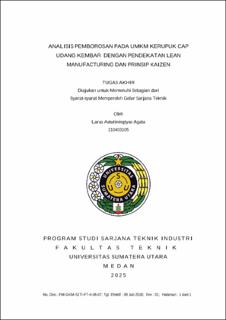Analisis Pemborosan pada UMKM Kerupuk Cap Udang Kembar dengan Pendekatan Lean Manufacturing dan Prinsip Kaizen
An Analysis of Waste in UMKM Kerupuk Cap Udang Kembar Through the Application of Lean Manufacturing and Kaizen Principles

Date
2025Author
Agata, Laras Astutiningtyas
Advisor(s)
Sari, Rahmi Meilina
Metadata
Show full item recordAbstract
Micro, Small, and Medium Enterprises (MSMEs) play a significant role in Indonesia's economy, particularly in the snack food industry such as cracker production. However, production efficiency often remains a challenge. UMKM Kerupuk Cap Udang Kembar is a micro enterprise engaged in the production of snack foods, specifically crackers. Although some machines are used in its production activities, many processes still rely heavily on manual labor and conventional systems. In practice, the production of Palembang crackers at this MSME often falls short of the monthly targets. Observations revealed the presence of non-value-added activities that indicate the existence of waste, which negatively impacts production efficiency. This study aims to identify and reduce waste in the Palembang cracker production process at UMKM Kerupuk Cap Udang Kembar through the application of Lean Manufacturing and Kaizen principles. The methods used include Value Stream Mapping (VSM), Process Activity Mapping (PAM), seven waste analysis, fishbone diagrams, and improvement strategies using the 5W+1H method. The analysis shows that the most dominant type of waste is waiting, particularly at the mixing and drying stations, with an initial Process Cycle Efficiency (PCE) of 44.52%. The root causes of waste stem from imbalanced work distribution, limited machine availability, and dependence on weather conditions. The proposed improvements focus on reevaluating task allocation using a line balancing approach and developing a hybrid drying system that utilizes oven machines. Post-improvement evaluation indicates a significant efficiency increase, with PCE rising to 84.95% and Non-Value-Added (NVA) activities decreasing from 49.88% to 2.88%. These findings demonstrate that the implementation of Lean and Kaizen can effectively enhance efficiency and reduce waste in MSMEs.
Collections
- Undergraduate Theses [1600]
